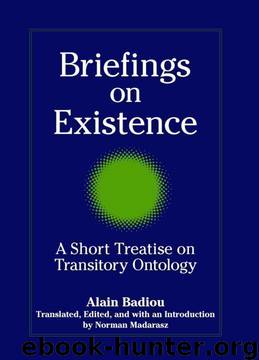Briefings on Existence: A Short Treatise on Transitory Ontology by Norman Madarasz & Alain Badiou

Author:Norman Madarasz & Alain Badiou [Madarasz, Norman & Badiou, Alain]
Language: eng
Format: epub
Tags: Literature & Fiction, History & Criticism, Criticism & Theory, Politics & Social Sciences, Philosophy, Logic & Language, Metaphysics, Science & Math, Mathematics, History, Pure Mathematics, Set Theory
Amazon: B007SRWALA
Publisher: State Univ of New York Pr
Published: 2006-04-03T04:00:00+00:00
5. The human intellect can also be defined by coupling. The immediate upshot of this is that the only points of truth are axiomatic and general. The singular is subtracted from every local subjective differential. This can also be said as: the Subject and the human mind's sole capability for the true is a mathematics of Being, or Being as mathematically thought. Every truth is generic.
Or else: what can be thought of Being is mathematical.
After which, I conclude that the more geometrico is true thought itself, as the thought of Being or of the "there is." Being can be thought only more geometrico. Conversely, all mathematical thought is thought of Being in a finite localization. As a matter of fact, this is why "the eyes of the mind are the proofs themselves." Outside of mathematics, we are blind.
In my opinion, the outcome is plain to see. God must be understood as mathematicity itself. The name of the "there is" is "matherne."
However, and in Spinoza's text itself, the paths by which to ascertain this result constrain us to open a space of thinking which is not under the norm of naming the "there is." These are what I call "operations of closure." Constitutive terms of this space are indeterminacy, difference, Subject, undecidability, atypicality, coupling, doubling, inclusion, and the genericity of the true, as well as a few others.
In the task of making this underbelly of mathematics explicit, we lack a founding category that is either exempted from the "there is," or supplements it. This is the point at which the concept of what I call the "event" has to enter. By introducing it, I am only treading on many others' footsteps. The event is also what grounds time, or rather times, event by event. Spinoza cared little for this. He strove to think according to his own expression "with no relation to time." He saw freedom expressed in "constant and eternal love of God" We can say instead, love in the pure elevation of the matheme, or better yet, in the love of the "there is," a kind of "intellectual" love that is never but the intuitive abbreviation of a proof, a glance with the mind's eyes.
Download
This site does not store any files on its server. We only index and link to content provided by other sites. Please contact the content providers to delete copyright contents if any and email us, we'll remove relevant links or contents immediately.
| Algebra | Calculus |
| Combinatorics | Discrete Mathematics |
| Finite Mathematics | Fractals |
| Functional Analysis | Group Theory |
| Logic | Number Theory |
| Set Theory |
Modelling of Convective Heat and Mass Transfer in Rotating Flows by Igor V. Shevchuk(6427)
Weapons of Math Destruction by Cathy O'Neil(6260)
Factfulness: Ten Reasons We're Wrong About the World – and Why Things Are Better Than You Think by Hans Rosling(4729)
A Mind For Numbers: How to Excel at Math and Science (Even If You Flunked Algebra) by Barbara Oakley(3293)
Descartes' Error by Antonio Damasio(3268)
Factfulness_Ten Reasons We're Wrong About the World_and Why Things Are Better Than You Think by Hans Rosling(3229)
TCP IP by Todd Lammle(3175)
Fooled by Randomness: The Hidden Role of Chance in Life and in the Markets by Nassim Nicholas Taleb(3103)
Applied Predictive Modeling by Max Kuhn & Kjell Johnson(3063)
The Tyranny of Metrics by Jerry Z. Muller(3056)
The Book of Numbers by Peter Bentley(2960)
The Great Unknown by Marcus du Sautoy(2687)
Once Upon an Algorithm by Martin Erwig(2640)
Easy Algebra Step-by-Step by Sandra Luna McCune(2625)
Lady Luck by Kristen Ashley(2574)
Police Exams Prep 2018-2019 by Kaplan Test Prep(2537)
Practical Guide To Principal Component Methods in R (Multivariate Analysis Book 2) by Alboukadel Kassambara(2534)
All Things Reconsidered by Bill Thompson III(2386)
Linear Time-Invariant Systems, Behaviors and Modules by Ulrich Oberst & Martin Scheicher & Ingrid Scheicher(2359)
